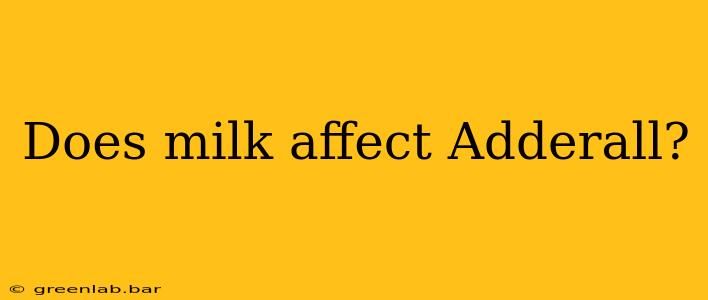Many individuals prescribed Adderall (amphetamine/dextroamphetamine) wonder about potential interactions with common foods and beverages. A frequently asked question revolves around milk: Does milk affect Adderall? The short answer is complex; there's no direct, dramatic interaction like some medications have, but the effects are nuanced and depend on individual factors. Let's delve into the details.
How Adderall Works in the Body
Before examining the milk question, it's crucial to understand how Adderall functions. Adderall is a central nervous system stimulant. It primarily works by increasing the levels of dopamine and norepinephrine in the brain, neurotransmitters associated with focus, attention, and energy. These increased levels are responsible for the drug's effects, such as improved concentration and reduced hyperactivity.
Milk and Adderall: The Interaction (or Lack Thereof)
There's no established scientific evidence indicating a direct, significant chemical interaction between milk and Adderall. Milk doesn't metabolize or break down the drug in a way that alters its effectiveness. It doesn't drastically impact absorption rates either.
However, this doesn't mean milk has absolutely no influence. The key lies in the individual's sensitivity and other factors:
1. Stomach Acid and Absorption:
Milk is slightly alkaline. While this alkalinity isn't likely to significantly change Adderall's absorption, some individuals with particularly sensitive stomachs might experience a slightly slower absorption rate with milk compared to water. This could mean a slightly delayed onset of effects, or potentially a less intense peak effect. However, this is highly individual and not a consistent observation.
2. Calcium and Other Nutrients:
Milk contains calcium and other nutrients. While no direct negative interaction is known, theoretically, a very high calcium intake could potentially interfere with the absorption of certain medications, though this is rare and hasn't been specifically proven with Adderall. This is more of a theoretical concern rather than a clinically observed effect.
3. Individual Sensitivities:
People react differently to medications and food. Some individuals might experience increased nausea or digestive discomfort when consuming milk alongside Adderall, even if this isn't a direct pharmacological interaction. This is related to individual sensitivities, not a specific interaction between the milk and the drug.
4. Full Stomach vs. Empty Stomach:
Taking Adderall on an empty stomach is generally recommended for faster and more predictable absorption. Consuming milk (or any food) with Adderall could potentially slow down the absorption, leading to a delayed onset of effects. This is more related to the principle of taking medication on an empty stomach than a milk-specific effect.
Conclusion: Milk and Adderall - A Cautious Approach
While there's no definitive evidence of a strong, detrimental interaction between milk and Adderall, it's best to approach the issue cautiously. If you're sensitive to changes in your stomach's pH, or if you find it impacts your digestive comfort, avoiding milk with your Adderall might be a prudent choice.
Always follow your doctor's instructions on how and when to take your medication. If you experience any unusual side effects after consuming milk with Adderall, contact your physician or pharmacist immediately. This advice doesn't replace professional medical guidance. Individual reactions vary significantly.
Disclaimer: This information is for educational purposes only and should not be considered medical advice. Always consult with your healthcare provider or pharmacist before making changes to your medication regimen or diet.

